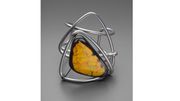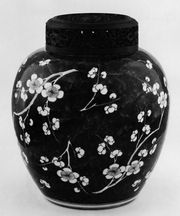Difference between revisions of "Crackle glass"
Jump to navigation
Jump to search
| (One intermediate revision by the same user not shown) | |||
| Line 3: | Line 3: | ||
A type of glass whose surface is covered with a pattern of fine cracks. Crackle glass, or ice glass, was first produced in Venice in the 16th century. There are two methods for production. The first involves dipping the hot glass into cold water to produce the cracks then reheating just enough for working. For the second method, small broken pieces of glass are picked up with the molten ball, then worked into the final form. Ceramics with a crackle pattern in the glaze are called crackleware. | A type of glass whose surface is covered with a pattern of fine cracks. Crackle glass, or ice glass, was first produced in Venice in the 16th century. There are two methods for production. The first involves dipping the hot glass into cold water to produce the cracks then reheating just enough for working. For the second method, small broken pieces of glass are picked up with the molten ball, then worked into the final form. Ceramics with a crackle pattern in the glaze are called crackleware. | ||
| − | [[File: | + | [[File:Ice crackle glaze.jpg|thumb|Chinese crackle glaze<br>MFA# 95.542]] |
== Synonyms and Related Terms == | == Synonyms and Related Terms == | ||
Latest revision as of 09:32, 25 August 2020
Description
A type of glass whose surface is covered with a pattern of fine cracks. Crackle glass, or ice glass, was first produced in Venice in the 16th century. There are two methods for production. The first involves dipping the hot glass into cold water to produce the cracks then reheating just enough for working. For the second method, small broken pieces of glass are picked up with the molten ball, then worked into the final form. Ceramics with a crackle pattern in the glaze are called crackleware.
Synonyms and Related Terms
verre craquelé (Fr.); vidro estalado (Port.); ice glass; craquelle; overshot; crackleware
Resources and Citations
- Dictionary of Building Preservation, Ward Bucher, ed., John Wiley & Sons, Inc., New York City, 1996
- Richard Buck, Inspecting and Describing the Condition of Art Objects, Museum Registration Methods, AAM, Washington DC, 1979

